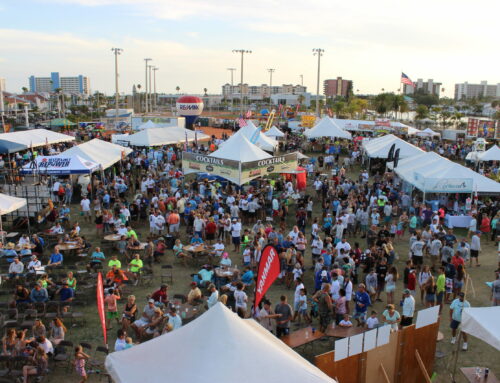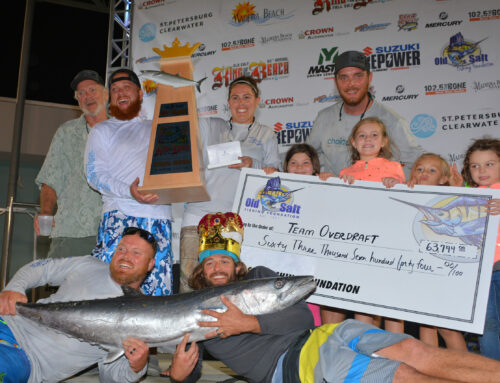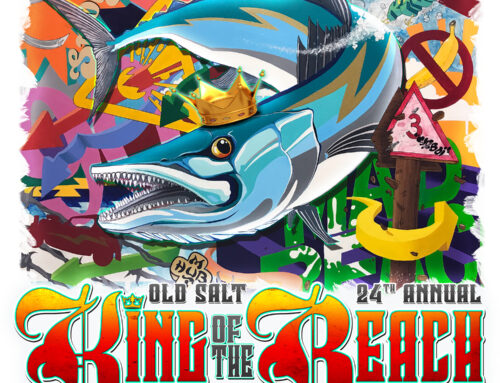 Justin Lee loves big-money king mackerel tournaments. The 35-year-old St. Petersburg man travels the kingfish circuit with Team Blacked Out Wells, and like most top-tier anglers, takes his fishing seriously.
Justin Lee loves big-money king mackerel tournaments. The 35-year-old St. Petersburg man travels the kingfish circuit with Team Blacked Out Wells, and like most top-tier anglers, takes his fishing seriously.
But twice a year, this father of two looks forward to the Old Salt King of the Beach Tournament at Madeira Beach so he can fish with his kids and still take home a record payout.
“We never miss them,” said Lee, who grew up fishing local beaches. “We love the KOB.”
For more than 20 years, the Old Salt Fishing Foundation has held what has become the premier kingfish tournaments on the west coast of Florida. Florida has many high-dollar kingfish events, but none draws as many anglers as the KOB.
For years, the competitive kingfish tournament scene was dominated by professionals — sponsored teams in big, fast boats that could run to the Dry Tortugas if it meant catching a winning fish. But the King of the Beach, with its tight geographic boundaries, leveled the playing field.
The result is an “everyman’s tournament,” where a lone angler fishing out of a flats boat stands just as good a chance of catching a tournament-winning fish as a team of anglers running a $200,000 center console.
Kingfish don’t care about big boats, but any veteran tournament fisherman will tell you that the prey of choice digs fancy big baits. That’s because these open-water predators are eating machines.
Every fall these schooling fish pass along local beaches on their migration, swallowing up everything that swims in order to help fuel their journey.
In the Gulf of Mexico, king mackerel spend the summer near the mouth of the Mississippi River. When the weather turns cool, about half of the population heads west and then south along the coast of Texas to winter off the Yucatan Peninsula.
The rest of the fish swim east, then south along Florida’s beaches to the waters off Key West. Anglers started catching the first southern-swimming kings off Naples in early October. But at that same time, fishermen still were catching kings off the Panhandle.
November is usually the peak month for big kings on the Suncoast, although the schools can arrive as early as October or linger as late as December. Peak feeding times often coincide with the arrival of cold fronts, which is why tournament anglers are used to fishing when it is cold, wet and nasty.
While king mackerel can be caught on artificial lures, most successful tournament anglers fish exclusively with live or natural bait. The baits of choice, at least in this area, are large blue runners.
In general, kingfish are widely considered to be one of the Gulf of Mexico’s most valuable recreational species. While there is a commercial kingfish industry, it is dwarfed by the recreational sector, which pumps millions into the state’s economy each year.
While kingfish can be found in the western Atlantic Ocean from Maine to Rio de Janeiro and throughout the Gulf of Mexico, Florida has the longest recreational fishing season. Peak feeding, and as a result, catching, depends on water temperature.
The magic number is 72 degrees. The migration used to be easily predicted. Years ago, daylight savings time usually triggered the start of the fall run. But in recent years, water temperatures have been erratic. Unseasonably warm water can delay the run, or worse, prompt the fish to keep moving.
But the fishing has been good in recent weeks and this weekend’s event should produce some large fish. With single outboard, women’s and youth divisions, the tournament offers several opportunities to win.
King of the Beach
What: Old Salt Fishing Foundation’s spring king mackerel tournament and Mad Beach Food Fest
When/where: Thursday-Saturday; Madeira Beach Recreation Park, 200 Rex Place
Divisions: Overall, single-engine outboard, women, youth, Spanish mackerel and tournament within a tournament; overall first prize of $50,000
More info: Visit oldsaltfishing.org
Written by: Terry Tomalin – Outdoor/Fitness Editor
© 2015 Tampa Bay Times




Leave A Comment